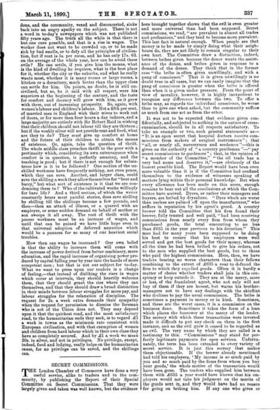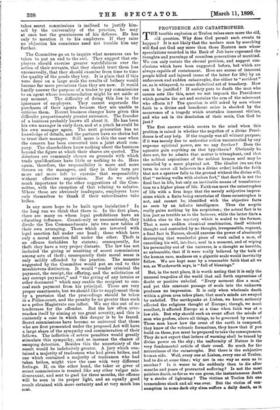SECRET COMMISSIONS. T HE London Chamber of Commerce have done a
very useful service, alike to traders and to the com- munity, by publishing the Report of their Special Committee on Secret Commissions. That they were largely given and taken was well known, but the evidence here brought together shows that the evil is even greater and more universal than had been supposed. Secret commissions, we read, "are prevalent in almost all trades and professions," and they tend to become more prevalent. This last fact is natural enough. When people see that money is to be made by simply doing what their neigh- bours do, they are not likely to remain singular to their own hurt. The Committee draw a distinction, indeed; between bribes given because the donor wants the assist- ance of the donee, and bribes given in response to a demand of the donee. They think that in the former case "the bribe is often given unwillingly, and with a pang of conscience." That it is given unwillingly is no doubt true in all cases, but we can easily imagine that the pang of conscience is greater when the bribe is offered than when it is given under pressure. From the point of view of morality, however, it is highly inexpedient to recognise any difference between the two. To offer a bribe may, as regards the individual conscience, be worse than to give one when asked, but the community suffers as much from one act as from the other.
It was not to be expected that evidence given con- fidentially, and subjected to nothing in the nature of cross- examination, should be in all respects satisfactory. To take an example or two, such general statements as— "It is an open secret that hospital doctors receive com- missions from makers of surgical instruments " ; that "all, or nearly all, nurserymen and seedsmen "—this is given on the authority of "a country gentleman "—" pay secret commissions to gardeners " ; that, in the opinion of "a member of the Committee," "the oil trade has a very bad name and deserves it,"—are obviously of the loosest possible kind. The Report would have been even more valuable than it is if the Committee had confined themselves to the evidence of witnesses speaking of matters lying within their personal knowledge. But when every allowance has been made on this score, enough remains to bear out all the conclusions at which the Com- mittee have arrived. Dyers, or rather their managers and buyers, are bribed by drysalters. "Dyes which are worse than useless are palmed off upon the manufacturer," who suffers in reputation by his agent's greed. A country brewer told the Committee that his firm found their brewer, fully trusted and well paid, "had been receiving commissions from nearly every firm from whom they purchased goods, the total amounting to no less than £635 in the year previous to his detection." This man had for many years been supposed to be doing his best to ensure that his employers were well served and got the beet goods for their money, whereas all the time he had been bribed to give his orders, not to the men who supplied the best goods, but to those who paid the highest commissions. Here, then, we have traders bearing no worse characters than their fellows combining to the extent of £635 a year to defraud the firm to which they supplied goods. Often it is hardly a matter of choice whether traders shall join in this con- spiracy or keep outside it. They are at the mercy, more or less, of the fraudulent agent, who not only will not buy of them if they are honest, but warns his brother- managers not to have any dealings with the skinflint who declines to pay the usual commission. The bribe is sometimes a payment in money or in kind. Sometimes, and these are the worst eases, it is a commission on the business done. Sometimes it takes the form of a loan which places the borrower at the mercy of the lender. The secrecy with which these transactions were invested made it difficult to put any check on them in the first instance, and as the evil grew it ceased to be regarded as an evil. The very name by which they are called is a testimony to this. "Commissions " may stand for per- fectly legitimate payments for open services. Unfortu- nately, the term has been extended to every variety of secret service. It is just this secrecy that makes them objectionable. If the brewer already mentioned had told his employers, My income is so much paid by you and so much paid by the firms from whom you buy your goods,' the whole motive of the transaction would have been gone. The traders who supplied him between them with £635 a year would have known that his em- ployers would not take his judgment on the merits of the goods sent in, and they would have had no reason for going on bribing him. If any one who gives or takes secret commissions is inclined to justify him- self by the universality of the practice, he may at once test the genuineness of his defence. He has only to mention it to his employers. If they raise no objection his conscience need not trouble him any further.
The Committee go on to inquire what measures can be taken to put an end to the evil. They suggest that em- ployers should exercise greater watchfulness over the action of their servants, that they should trust them less unreservedly, that they should examine from time to time the quality of the goods they buy. It is plain that if this were done on a large scale the results of bribery would become far more precarious than they are now. It would hardly answer the purpose of a trader to pay commissions to an agent whose recommendation might be set aside at any moment. The difficulty of doing this lies in the ignorance of employers. They cannot supersede the purchases of their agents because they are unable to criticise them. Recent business changes have given this difficulty proportionately greater extension. The founder of a business probably knows all about it. He has been his own manager in early days, and at a pinch he could be his own manager again. The next generation has no knowledge of details, and the partners have no choice but to trust their manager. Still more is this the case when the concern has been converted into a joint stock com- pany. The shareholders know nothing about the business beyond the figure at which their shares are quoted. The directors are commonly chosen on grounds with which trade qualifications have little or nothing to do. Here again, therefore, the responsibility is more and more thrown on the managers, and they in their turn are more and more left to exercise that responsibility without effective supervision. Nor do we attach much importance to the other suggestions of the Com- mittee, with the exception of that relating to salaries. Where these are obviously inadequate, employers have only themselves to thank if their subordinates take bribes.
Is any more hope to be built upon legislation ? In the long run we think that there is. In the first place, there are many on whom legal prohibitions have an educating influence. Consciously or unconsciously, they divide the Ten Commandments into two new tables of their own arranging. Those which are invested with legal sanction fall under one head ; those which have only a moral sanction fall under the other. Theft is an offence forbidden by statute; consequently, for theft they have a very proper distaste. The law has not included the giving or receiving of secret commissions among acts of theft ; consequently their moral sense is only mildly offended by the practice. The measure suggested by the Committee would put an end to this mischievous distinction. It would "render criminal the payment, the receipt, the offering, and the solicitation of any corrupt payment," and "the giving of any invoice or other document" which may enable the recipient to con- ceal such payment from his principal. These are very proper enactments, but we should like to supplement them by a provision that the proceedings should be taken in a Police-court, and the penalty be no greater than such as a police Magistrate can inflict. We say this out of no tenderness for the offender. But the law often over- reaches itself by aiming at too great severity, and this is eminently a case in which this danger is to be feared. Secret commissions have become so universal that those who are first prosecuted under the proposed Act will have a large share of the sympathy and commiseration of their fellows. The infliction of severe penalties would greatly stimulate this sympathy, and so increase the chance of escaping detection. Besides this the uncertainty of the result would be indefinitely greater. A jury which con- tained a majority of tradesmen who had given bribes, and one which contained a majority of tradesmen who had taken bribes, might view the case with very different feelings. If, on the other hand, the taker or giver of secret commissions is treated like any other vulgar mis- demeanant, and sent to gaol for three months, the offence will be seen in its proper light., and an equally good result obtained, with more certainty and at very much less cost.







































 Previous page
Previous page